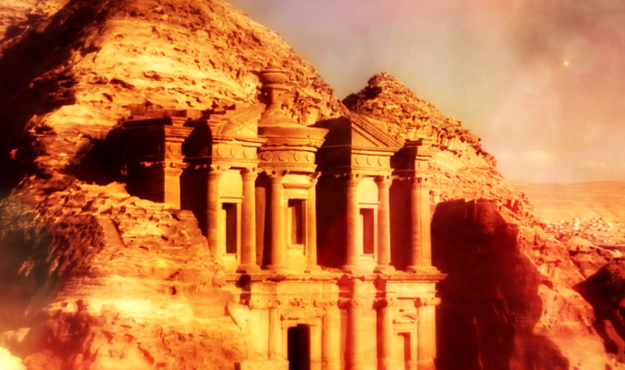Sufyaan [ibn ‘Uyayanah] narrated to us from ‘Abdullaah ibn Deenaar from ‘Abdullaah ibn ‘Umar (radhiAllaahu anhu) that the Prophet (Sallallahu alayhi wassallam) said,
“Do not enter the ruins of the people who were previously punished unless you are weeping. If you are not weeping, then do not enter their ruins, for I fear that what has befallen them may also befall you.” [Musnad Ahmad, Vol. 2, p. 9. The isnaad of this hadeeth is saheeh according to the conditions set by al-Bukhari and Muslim.]
The Prophet (Sallallahu alayhi wassallam) said this to his companions when he led them, in 9 AH, in an expedition to Tabook (about 400 miles north of Madinah) against the Roman forces on a reported invasion from Syria and reached al-Hijr, one of the archaeological remains of the Thamood, to whom Allah sent Prophet Saalih (alayhis salaam). The arrogant Thamood people were severely punished by Allah when He sent to them thunderbolts, followed by terrible earthquakes which destroyed their homes and buried them: “So the mighty blast took the wrong-doers unawares, and they lay prostrate in their homes before the morning.” [Surah Hud, 11:67]
According to Sheikh ‘Abdul-‘Azeez ibn Baaz (may Allah have mercy on him), it is not permissible to visit the ruins of the people who were punished by Allah if the purpose of the visit is mere sightseeing. [Permanent Committee fatwa no. 26/394]
Even the Prophet (Sallallahu alayhi wassallam) hurried as he passed by Waadi Muhassar between Mina and Muzdalifah, the very place where Allah destroyed Abrahah and his forces that came with a mighty army and elephants to destroy the Kaabah. If one happens to pass by such ruins, one must contemplate the punishment that Allah inflicted on the sinners who disobeyed Him blatantly and feel the awe of the situation to the point of weeping, otherwise one should hurry and leave.
Ibn al-Qayyim (may Allah have mercy on him) said, whilst listing the lessons and rulings learned from the campaign to Tabook:
One who passes by the places of those who were subjected to divine wrath or who were punished should not enter them or stay among them, rather he should hasten to move on and should cover his head with his garment until he has passed them, and he should not enter upon them unless he is weeping and willing to learn a lesson. An example of this is when the Prophet (Sallallahu alayhi wassallam) hastened to move on in the valley of Muhassar, between Mina and Muzdalifah, because it was the place where Allah destroyed the elephant and its companions.
[Zaad al-Ma’aad (3/560)]
Al-Haafiz Ibn Hajar (may Allah have mercy on him) said, commenting on the hadeeth quoted above:
This applies to the dwellings of Thamood and others like them, though the reason was given concerning them.
[Fath al-Baari (6/380)]
It was narrated from Naafi’ that ‘Abdullah ibn ‘Umar (radhiAllaahu anhum) told him that the people stopped at al-Hijr, the land of Thamood, with the Messenger of Allah (Sallallahu alayhi wassallam), and they drew water from its wells and made dough with it. The Messenger of Allah (Sallallahu alayhi wassallam) told them to throw away the water they had drawn from its wells.
[Narrated by al-Bukhaari, 3199]
Ibn al-‘Arabi al-Maaliki (may Allah have mercy on him) said:
The Prophet (Sallallahu alayhi wassallam) instructed them to throw away the water from the land of Thamood, and to throw away the dough they had made with it, because it was water that was subjected to divine wrath, so it was not permissible to make use of it, so as to avoid the wrath of Allah. And he said: “Feed it to the camels.” This also indicates that with regard to food and drink that it is not permissible to use, it is permissible to feed it to camels and other animals, because they are not accountable. For that reason, Maalik said concerning impure honey, that it may be fed to bees. Similarly, it is not permissible to pray in those lands, because they are lands that were subject to divine wrath and anger. The Prophet (Sallallahu alayhi wassallam) said: “Do not enter them unless you are weeping.” And it was narrated that he covered his head with his rida’ (upper garment) and made his mount move faster until he came out of that place.
[Ahkaam al-Qur’an, 5/152]
Shaykh al-Islam Ibn Taymiyah (may Allah have mercy on him) said:
The Messenger of Allah (Sallallahu alayhi wassallam) forbade entering upon the places of those who were subjected to divine punishment, unless one is weeping, lest there befall the one who enters the same as befell them. He also forbade making use of their water, to such an extent that despite their need for it during that campaign –the campaign of hardship (the campaign to Tabook), which was the hardest campaign for the Muslims – he instructed them to feed the dough made with that water to their camels.
[Iqtida’ as-Siraat al-Mustaqeem, p. 80]
And Allah knows best.
 navedz.com a muslim's Quest for the truth
navedz.com a muslim's Quest for the truth







